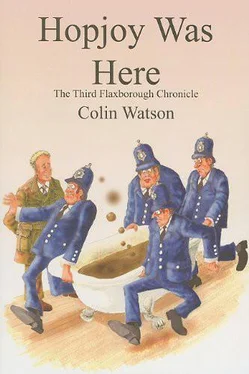After an interval he deemed long enough to signify admiration, Purbright resumed his questioning.
“Do you happen to know who owns the car that’s garaged next door?”
“Oh, yes; that’s Mr Hopjoy’s. Is it there now?”
“Not at the moment. When did you last see it, Mrs Sayers?”
“About a week ago, I should think. I can’t say just...” She frowned. “It’s a biggish car. Beige. And ever so quiet.” She opened her eyes to see if the inspector would accept this information as a substitute for what he had wanted to know.
“But you can’t remember—to a day or so, even—when you saw it last. And who was driving it.”
She shook her head. “I’m not awfully observant of cars. And of course they both drive it a good deal; I suppose Mr Hopjoy lends it when he doesn’t want it for his work.”
“I see. Now, Mrs Sayers, I’m going to ask you to think back very carefully to last Thursday just one week ago today. Does anything happen on Thursdays that might fix one in your mind?”
“Well, there’s the laundry...and the Brains Trust on television...” She paused, seemingly unable to peer past so notable a peak, then suddenly patted her knee. “Thursday—yes, I remember last Thursday; of course I do. It was Thursday that Arnold arrived. My second brother. He called on his way down from Hull.”
“Fine. Now try going over in your mind what happened that day—from one thing to the next, you know—and see if anything links up with next door. Never mind whether it seems important or not. Start right from getting up in the morning.”
Mrs Sayers, benignly co-operative, folded her hands and launched into a meticulous description of a day in the life of a Flaxborough widow. She spoke for nearly twenty minutes. Purbright learned, among many, many other things, three facts of possible relevance to his inquiry. On opening the door to take in the milk, Mrs Sayers had noticed Gordon Periam bolting back his gates. Some sixteen hours later, just before making up her brother’s bed, she had looked down from the spare bedroom window to see Mr Hopjoy’s car draw up. Gordon Periam—she was almost sure it was Gordon—got out and began unlocking the garage door. Finally, Mrs Sayers recalled a little vaguely having been awakened by the shutting of a door—that of the garage, she thought—and hearing a car with a quiet engine drive away. She did not know at what time this happened, but she had the impression that it was two or three o’clock on the Friday morning.
Purbright felt that Mrs Sayers’s mind, such as it was, had been thoroughly worked out. But he made a last few random borings.
“Have you at any time recently seen a big, heavy package being carried into Mr Periam’s?”
She had not.
“Since last Thursday, do you happen to have heard a noise like glass breaking? Next door, I mean.”
“There hasn’t been a sound from there all this past week, inspector. Not a sound.” She stared at him, for the first time looking afraid. “Well, they’ve been away, haven’t they?”
“It seems they have, yes.” Purbright regarded absently a complicated bronze affair on the mantelpiece. It depicted an anxious nude heaving at the reins of a horse that had been maddened apparently by the grafting of a gilt clock to its belly. “That’s nearly ten minutes fast,” explained Mrs Sayers. Purbright, fearful of inviting a history of the bronze, looked quickly away.
He said: “The bathroom next door...it’s on the farther side of the house, I notice. Would any of the neighbours have a view of its window?”
“Well, only from the back, I should say. The houses in Pawson’s Lane; that’s where the ladies I told you about live. Mrs Cork and her daughter.”
“Would you say that they are inclined to be...” he paused, glancing at his palm...“interested in people around here?”
“Miriam’s drattedly nosey, if that’s what you mean.”
“To the extent of writing anonymous letters?” Purbright saw a grin of gratification pouch Mrs Sayers’s pink face. “Ah,” she said, “you’ve had one of those, have you?” She puffed out her lips and accompanied speech with a slight shaking of her head: “Yes, oh well, I knew ages ago that she’d got to the scribbling stage.” She lowered her voice and added mysteriously: “The Change, you know.”
“She isn’t a bit off the beam, is she?”
“Goodness me, no! Perfectly level-headed. And no harm in her, really. I think she just hasn’t enough to do. She never had.” Again the voice plunged confidentially. “Properly speaking and if all were told, inspector, the mother is Miss Cork. Miriam’s illegit.”
Mrs Sayers, satisfied as a blood donor, leaned slowly back in her chair. “I’m dying to know what Miriam wrote to you about. Do tell me.”
The inspector smiled apologetically. “We did receive a letter, Mrs Sayers. I think there’s no harm in your knowing that. It alleged some sort of a disturbance at number fourteen. The bathroom was mentioned. But I don’t know that we can assume who wrote it.”
“We can put two and two together, though, can’t we?”
“Ah, Mrs Sayers, if all the twos put together in this town had proved fertile we should be overrun with fours. I’m afraid I have been keeping you from your lunch.” He moved the ashtray with which Mrs Sayers had supplied him, a china representation of a Dutch clog, from his chair arm to the coffee table, and stood up. “There’s just one thing...”
Mrs Sayers looked round for Trevor’s cage cover. “Yes?”
“I was wondering if you happened to know where we might pick up a photograph of Mr Periam. There are one or two portraits next door, but I don’t suppose he’s a choirboy any longer.”
Mrs Sayers held up a promissory finger, pondered a moment, and trotted out of the room.
Trevor, still untented, immediately became hysterical. It nodded violently, issuing a series of high frequency squawks that produced in Purbright the sensation of piano wires being jerkily reeled in through his ears. He tried to imitate Mrs Sayers’s method of soothing communion but this merely agitated the bird more. He made faces at it, growled, miaowed, muttered words of the kind that are passed to magistrates on slips of paper. Trevor’s slate pencil monody persisted. In a final attempt, Purbright drew desperately on his cigarette and filled the cage with smoke. He was rewarded immediately. The bird swayed a little, raised one claw, then hunched into immobility and utter silence.
Purbright was standing by the window with his back to the fumigated budgerigar when Mrs Sayers bustled in with a photograph.
“Here we are: this was taken at last year’s Operatic. The Student Prince . That’s Gordon—the one holding up the beer mug thing in the second row.”
Purbright examined the picture. It showed upwards of thirty members of the Flaxborough Amateur Operatic Society transfixed in self-conscious attitudes of Ruritanian abandon. There was a wealth of false mustachios, arms akimbo, flourished steins, peasant blouses (“I helped with the costumes,” proclaimed Mrs Sayers) and feet on chairs. A drinking song was clearly in progress. In the foreground was a pair whom Purbright assumed to be the principals of the show. Disguised as a prince disguised as a student, forty-eight-year-old Jack Bottomley, bachelor proprietor of the Freemasons’ Arms, accompanied his singing with a stiff, resolute gesture; he looked like a learner driver about to turn left. His other hand grasped the waist of the Society’s perennial soprano lead, Miss Hilda Cannon, a stick-like female whose desperate grin of simulated coquetry was belied by the angle at which she leaned away from the draught of Mr Bottomley’s romantic protestations...
“No, no; that one’s Gordon.” Mrs Sayers’s plump little finger redirected Purbright’s attention to the face in the second row.
Читать дальше

![Fredrik Backman - Britt-Marie Was Here [Britt-Marie var här]](/books/61260/fredrik-backman-britt-marie-was-here-britt-thumb.webp)










